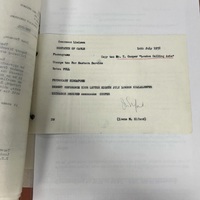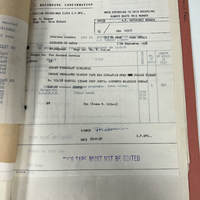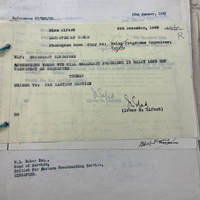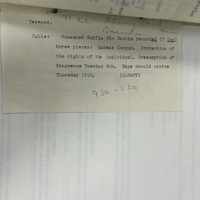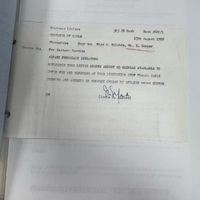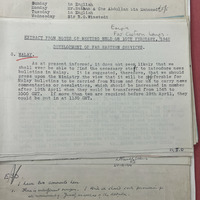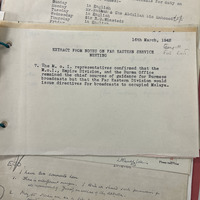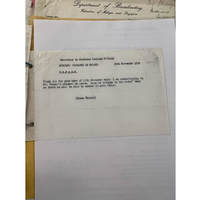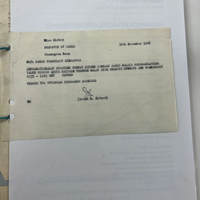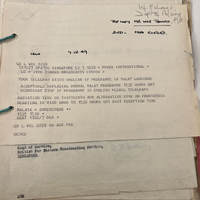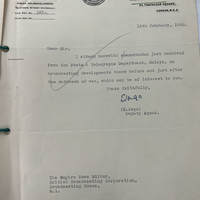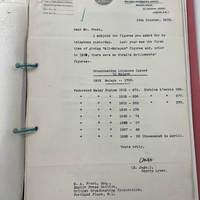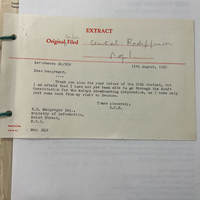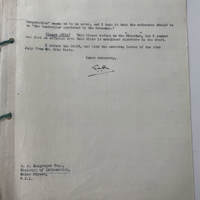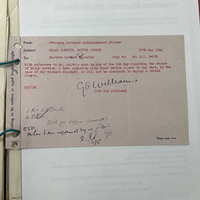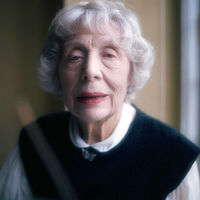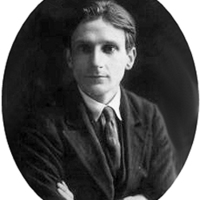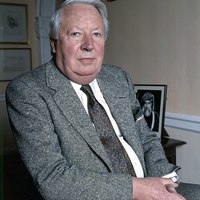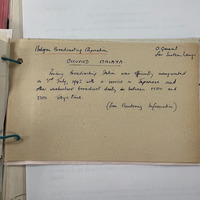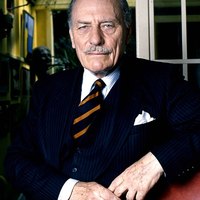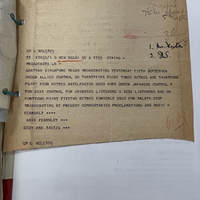Search
787 items
-
Terence Cooper writes to Peter Albany to let him know that the tape of Mishcon's comments (the BBC London contributor) has been sent and will arrive in Singapore on British Airlines flight 715/18. He also notes that Suffia's responses from Radio Malaya should arrive on Monday at the latest. More »Message
-
Ivor Thomas confirms the 1235 broadcast will be in the Malay Language (in reply to BBC_616) More »Message
-
A cable dispatch informing Terence Cooper of the telegraph sent on September 7, 1958 (item designation BBC_311) More »Message
-
Cable dispatch from Irene Elford stipulating a budget of 25 Guineas to cover expenses More »Message
-
It was discussed that they do not have adequate number of staff to introduce news bulletins to the Malaya, and it was suggested that they carry new commentaries of newsletters instead. More »Article
-
It was discussed that the M.O.I. representatives confirmed chief guiding offices for Burmese and Malaya broadcasts. More »Article
-
Diana Badder writes to inform HBFEBS that Ivor Thomas is on leave, and will return in two weeks. More »Message
-
Irene M Elford writes to WR Baker to inform him of the rebroadcast of the "Britain through Malay eyes" program. More »Message
-
Sir Frank Fraser Darling FRSE (23 June 1903 – 22 October 1979) was an English ecologist, ornithologist, farmer, conservationist and author, who is strongly associated with the highlands and islands of Scotland. He gives his name to the Fraser Darling effect. (Wikipedia) More »Person
-
A dubbing process of NSA-owned discs and albums, transferred to Betamax cassette stereo. More »Spoken voice |Audio
-
A telegraph asking if the programme will be in the Malay language More »Message
-
Sender attatches the memorandum made by the Posts and Telegraph Department in light of the war. More »Message
-
E. Jago notes that prior to 1930, there were no fifures on Straits Settlements, then attaches the numbers of licences in Malaya More »Message
-
E.C. Robbins informs Macrgegor that he has not read the Draft Constitution. More »Message
-
E.C. Robbins mentions to J.C.S. Macgregor provisions such as Clauses 31 and 33 be given a thought for their own constitution;and there are following points on the Draft Constitution for the Malaya Broadcasting Corporation to be considered. Clauses 3, 10(1), and Clause 26(11). More »Message
-
Sir Guy William states that with reference to Mr. A.C. Smiths note on censor of Malay Service, he has authority to suggest that it is unnecessary to emplou a Switch Censor. More »Message
-
Dame Edith Mary Evans, DBE (8 February 1888 – 14 October 1976) was an English actress. She was best known for her work on the stage, but also appeared in films at the beginning and towards the end of her career. Between 1964 and 1968, she was nominated for three Academy Awards. More »Person
-
Edmund Charles Blunden CBE MC (1 November 1896 – 20 January 1974) was an English poet, author, and critic. Like his friend Siegfried Sassoon, he wrote of his experiences in World War I in both verse and prose. For most of his career, Blunden was also a reviewer for English publications and an academic in Tokyo and later Hong Kong. He ended his career as Professor of Poetry at the University of Oxford. He was nominated for the Nobel Prize in Literature six times. (Wikipedia) More »Person
-
Sir Edward Richard George Heath (9 July 1916 – 17 July 2005), commonly known as Ted Heath, was a British politician who served as Prime Minister of the United Kingdom from 1970 to 1974 and Leader of the Conservative Party from 1965 to 1975. Heath also served for 51 years as a Member of Parliament from 1950 to 2001. Outside politics, Heath was a yachtsman, a musician, and an author. Born to a lady's maid and a carpenter, Heath was educated at a grammar school in Ramsgate, Kent (Chatham House Grammar School for boys) and became a leader within student politics while studying at the University of Oxford. He served as an officer in the Royal Artillery during the Second World War. He worked briefly in the Civil Service, but resigned in order to stand for Parliament, and was elected for Bexley at the 1950 election. He was promoted to become Chief Whip by Anthony Eden in 1955, and in 1959 was appointed to the Cabinet by Harold Macmillan as Minister of Labour. He later held the role of Lord Privy Seal and in 1963, was made President of the Board of Trade by Alec Douglas-Home. After the Conservatives were defeated at the 1964 election, Heath was elected as Leader of the Conservative Party in 1965, becoming Leader of the Opposition. Although he led the Conservatives to a landslide defeat at the 1966 election, he remained in the leadership, and at the 1970 election led his party to an unexpected victory. During his time as prime minister, Heath oversaw the decimalisation of British coinage in 1971, and in 1972 he led the reformation of local government, significantly reducing the number of local authorities and creating several new metropolitan counties, much of which remains to this day. Perhaps Heath's most prominent achievement came in 1973, when he led the United Kingdom into membership of the European Communities popularly known as entry to the Common Market (which would later become the European Union) as a member state. Heath had always been a strong supporter of British membership of the EC, and after winning the decisive vote in the House of Commons by 356 to 244 to join, he led the negotiations that culminated in the UK's entry into the EC on 1 January 1973. According to biographer John Campbell, Heath regarded this as his personal "finest hour".Heath's time as prime minister also coincided with the height of the Troubles in Northern Ireland, with his approval of internment without trial and subsequent suspension of the Stormont Parliament seeing the imposition of direct British rule. Unofficial talks with Provisional Irish Republican Army delegates were unsuccessful, as was the Sunningdale Agreement of 1973, which led the MPs of the Ulster Unionist Party to withdraw from the Conservative whip. Heath also tried to reform British trade unionism with the Industrial Relations Act, and hoped to deregulate the economy and make a transfer from direct to indirect taxation. However, a miners' strike at the start of 1974 severely damaged the Government, causing the implementation of the Three-Day Week to conserve energy. Attempting to resolve the situation, Heath called an election for February 1974, attempting to obtain a mandate to face down the miners' wage demands, but this instead resulted in a hung parliament, with the Conservatives losing their majority. Despite gaining fewer votes, the Labour Party won four more seats, and Heath resigned as Prime Minister on 4 March after talks with the Liberal Party to form a coalition government were unsuccessful. After losing a second successive election in October 1974, Heath insisted he would continue as leader, but in January 1975, Margaret Thatcher announced she would challenge Heath for the leadership, and on 4 February, she narrowly outpolled him in the first round. Heath chose to resign the leadership rather than contest the second round. Heath returned to the backbenches, where he would remain until 2001. In 1975, he played a major role in the referendum on British membership of the EC, campaigning for the eventually successful "Yes" vote to remain in the Community. Heath would later become an embittered critic of Thatcher during her time as prime minister, speaking and writing against the policies of Thatcherism. Following the 1992 election, he became Father of the House, until his retirement from the Commons in 2001. He died in 2005, aged 89. Heath is one of four British prime ministers never to have married. He has been described by the BBC as "the first working-class meritocrat" to become Conservative leader in "the party's modern history" and "a One Nation Tory in the Disraeli tradition who rejected the laissez-faire capitalism that Thatcher would enthusiastically endorse." (Wikipedia) More »Person
-
Edward Henry Harold Ward, 7th Viscount Bangor (5 November 1905 – 8 May 1993), was an Anglo-Irish peer, journalist, war correspondent, and author. He worked under the name Edward Ward. (Wikipedia) More »Person
-
The list of schedule for the day-by-day transmisson in the daily service in Indonesia. More »Article
-
John Enoch Powell (16 June 1912 – 8 February 1998) was a British politician. He served as a Conservative Member of Parliament (1950–1974) and was Minister of Health (1960–1963) then Ulster Unionist Party (UUP) MP (1974–1987). Before entering politics, Powell was a classical scholar. During the Second World War, he served in both staff and intelligence positions, reaching the rank of brigadier. He also wrote poetry, and many books on classical and political subjects. Powell attracted widespread attention for his "Rivers of Blood" speech, delivered on 20 April 1968 to the General Meeting of the West Midlands Area Conservative Political Centre. In it, Powell criticised the rates of immigration into the UK, especially from the New Commonwealth, and opposed the anti-discrimination legislation Race Relations Bill. The speech drew sharp criticism from some of Powell's own party members and The Times, with Conservative Party leader Edward Heath dismissing Powell a day after the speech from his position as Shadow Defence Secretary. In the aftermath of the speech, several polls suggested that 67 to 82 per cent of the UK population agreed with Powell's opinions. His supporters claimed that the large public following that Powell attracted helped the Conservatives to win the 1970 general election, and perhaps cost them the February 1974 general election, when Powell turned his back on the Conservatives by endorsing a vote for Labour, which returned as a minority government. Powell was returned to the House of Commons in October 1974 as the Ulster Unionist Party MP for the Northern Ireland constituency of South Down. He represented the constituency until he was defeated at the 1987 general election. (Wikipedia) More »Person
-
In a collection of radio broadcasts spanning various languages and historical moments, key figures such as Edward Heath, John F. Kennedy, and Margaret Rutherford are featured in interviews and speeches. The recording also includes significant events such as the recovery of the Mercury-Atlas 6 spacecraft and addresses by world leaders like Charles de Gaulle and U Thant. The diverse range of content provides a valuable insight into political and cultural milestones throughout history. More »Spoken voice |Topic: Culture | Politics |Audio
-
Ernest Lush (23 January 1908 – 12 May 1988) was an English classical pianist who was best known as an accompanist. (Wikipedia) More »Person
-
An excerpt from an interview with Tommy Handley, a male speaker, and an unidentified male announcer, recorded on a BBC Radio tape reel with a paper insert listing the contents. More »Spoken voice |Topic: Culture |Audio
Show filters +

